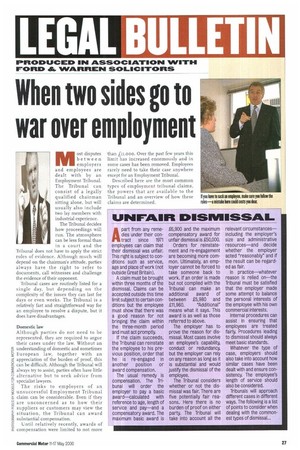1,11101101ISSALL, A part from any remedies under their contract since 1971
Page 29

If you've noticed an error in this article please click here to report it so we can fix it.
employees can claim that their dismissal was unfair. This right is subject to conditions such as service, age and place of work (not outside Great Britain).
A claim must be brought within three months of the dismissal. Claims can be accepted outside this time limit subject to certain conditions but the employee must show that there was a good reason for not bringing the claim within the three-month period and must act promptly.
If the claim succeeds, the Tribunal can reinstate the employee to his previous position, order that he is re-engaged in another position or award compensation.
The usual remedy is compensation. The Tribunal will order the employer to pay a basic award—calculated with reference to age, length of service and pay—and a compensatory award. The maximum basic award is £6,900 and the maximum compensatory award for unfair dismissal is £50,000.
Orders for reinstatement and re-engagement are becoming more common. Ultimately, an employer cannot be forced to take someone back to work. If an order is made but not complied with the Tribunal can make an additional award of between 15,980 and 211,960. "Additional" means what it says. This award is as well as those referred to above.
The employer has to prove the reason for dismissal. Most cases involve an employee's capability, conduct or redundancy, but the employer can rely on any reason as long as it is substantial and would justify the dismissal of the employee.
The Tribunal considers whether or not the dismissal was fair. There are five potentially fair reasons. Here there is no burden of proof on either party. The Tribunal will take into account all the relevant circumstances— including the employer's size and administrative resources—and decide whether the employer acted "reasonably" and if the result can be regarded as fair.
In practice—whatever reason is relied on—the Tribunal must be satisfied that the employer made some attempt to balance the personal interests of the employee with his own commercial interests.
Internal procedures can assist in ensuring that employees are treated fairly. Procedures leading to dismissal should always meet basic standards.
Whatever the type of case, employers should also take into account how similar cases have been dealt with and ensure consistency. The employee's length of service should also be considered.
Tribunals will approach different cases in different ways. The following is a list of points to consider when dealing with the commonest types of dismissal...




































































































